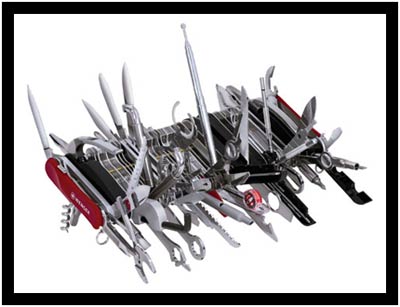The Great Pocket Knife Exchange
 Here’s an Idea:
Here’s an Idea:
I used to carry around a Victorinox Swiss Army knife. The first one I owned was a present for my 16th birthday. Thinking back, I must have had that red-and-white knife in my pocket most every day for 13 years or so. I took it to work with me every day and it was an essential tool to take on vacations to foreign countries. Then, of course, September 11th, 2001. Being a big fan of traveling without checked luggage, I was forever forced to leave my knife at home. Sadly, after a month-long vacation at the end of 2001, I got used to an empty pocket.
I still have a Swiss Army penknife on my keychain; however, I only ever seem to use it for cutting through packaging tape. I miss the utility of a bigger knife, but I’m not sure I’ll ever go back to carrying one. The spot I reserved for it, my right front pants pocket — keys on the left, wallet back right, loose change goes uncomfortably in the back left, otherwise it scratches up my phone or flies every which direction when I extract my keys — is now occupied by a cell phone.
I’ll wager the biggest hazard to Swiss Army knives and Leathermans (Leathermen?) is the TSA. We’ve all heard stories of the stressed-out passengers who, after hours spent zigzagging through airport security lines, are forced to give up their expensive Swiss Army Knife, Leatherman, Zippo lighter, or any number of other “terrorist” items like, you know, a bottle of Diet Coke. Rather than allowing the TSA to auction off our personal items on eBay, there’s got to be a business model here.
Idea:
Set up kiosks in each airport, ideally in close proximity to the TSA screening areas. When items are inevitably confiscated, passengers would be given the opportunity to trade them in for a ticket. The ticket will record what item was left behind, and will be redeemable for an equivalent item, at a similar kiosk, in the airport of their destination.
I’m thinking this would work a lot like the DVD rental stores that have been popping up in airports. Rent a portable DVD player and a couple movies in Sea-Tac, return them to a different store on the way to the baggage claim at LAX.
Unfortunately, there would be no guarantee that the kiosk at your destination would have the same model of pocket knife for exchange. In that case, the enterprising business could opt to let you select an item of equivalent value, or let you keep your ticket until you return home. If all the kiosks’ inventory were tracked by computer, it should be easy enough to notify the “home airport” to hang on to the passenger’s original item until their return. In fact, that could be another whole aspect to the business. Instead of an exchange (which would only really be advantageous to the passenger that simply must have a pocket knife or lighter while traveling), the kiosk could simply be a storage area for those passengers that forgot to leave behind or check their “dangerous” items. It could operate like a pawn shop, holding the item for a set amount of time before ultimately gaining the right to sell unclaimed items for a profit.
An idea like this would initially only work in the major airports, but over time, if inventory is collected and redistributed intelligently, I could see it expanding to out-of-the-way places like Juneau International. Of course, to make it profitable, the business would probably have to charge for the service, but I’d much rather pay a small fee than surrender a 13-year-old birthday present to the TSA simply because I was running late for my flight.

 Here’s an idea.
Here’s an idea.